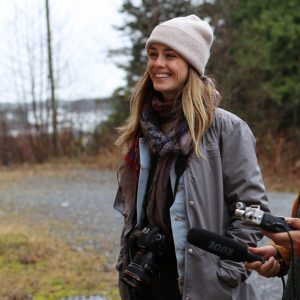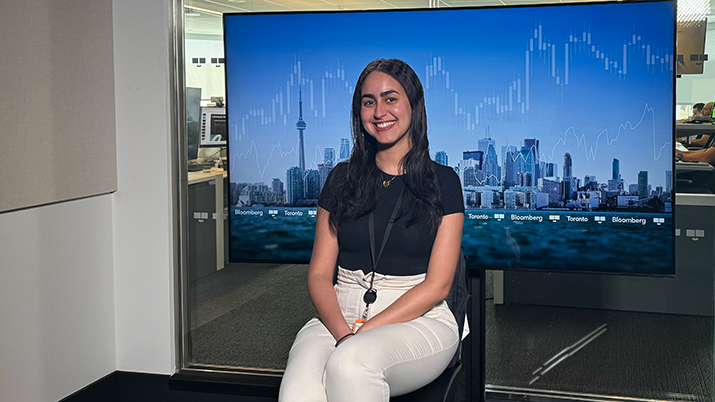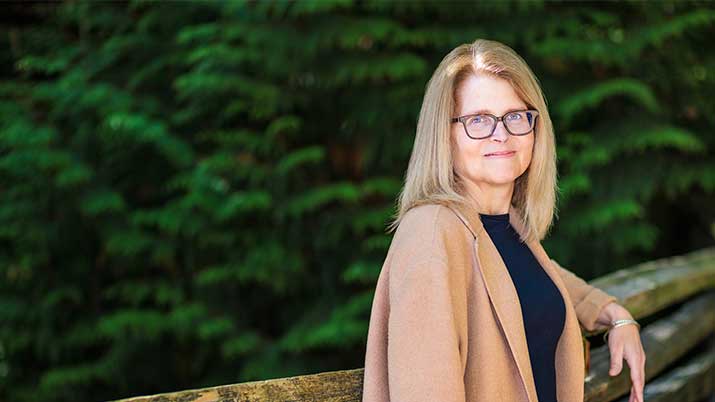Brenna Owen graduated with a Master of Journalism from UBC in 2019. She is currently a reporter-editor with The Canadian Press in Vancouver. Before joining the national news wire as a weekend reporter in summer 2019, Owen freelanced for Canada’s National Observer and worked as an occasional associate producer in current affairs radio at CBC Vancouver.
Here’s what she has to say:
Can you tell us a bit about your journalism background before joining UBC?
A few years before arriving at UBC, I worked as a programming coordinator for the community radio station on my undergraduate campus. I did my bachelor’s in politics with a minor in history at Queen’s University and I volunteered at the station, CFRC, for three years. Right after I graduated, I started working as the news coordinator, producing three local news episodes each week. I finished my time at CFRC as the coordinator for spoken word programming.
So that’s really where my roots in journalism lie. Although campus radio is so different from what I’m doing now, it allowed me to get out there, talk to people, get comfortable with interviewing and hone my ability to ask better questions. It also gave me audio skills. Ultimately, my community radio experience helped propel me to apply for journalism school.


Photo credit: Lauren Donnelly
What are some areas of journalism that you’re interested in?
I cover all kinds of different news and current affairs in B.C. and of course, right now I’m often focused on the pandemic. I’m interested in reporting on government policy and accountability, resource-based industries, gender, mental health and the courts, to name a few areas. The first radio episode I produced at CFRC was about climate change, so I’ve always been interested in reporting on environmental issues and how they intersect with social concerns. Also, I love radio and stories with strong personal voices. Even though I’m not working in radio right now, I do love the medium. I’ll also say that Kathryn (Gretsinger) is such an incredible mentor when it comes to audio storytelling, with her breadth of experience, so we definitely had audio opportunities at UBC.
What made you choose UBC for graduate studies?
It’s actually the only journalism school that I applied to, and the only grad school that I applied to in 2017. There’s a handful of journalism schools in the country and the program had a lot of elements that I was looking for, along with the opportunity to live in B.C. The Reporting in Indigenous Communities course was a major draw for me, along with its faculty. I was looking for a deeper understanding of the relationship between media and Indigenous communities in Canada, and how I could approach stories with that knowledge in mind. I was also able to take elective courses at UBC that related to my reporting interests.
What are some of the biggest takeaways from your time at UBC?
I would not be where I am now, working in my current position without the degree, that much is certain. I would say it provided me with a jumping-off point to really become a reporter once I started working after graduating. People have very different levels of experience with reporting coming into journalism school, and like I mentioned, I had the community radio experience, and I’d written a few stories for my campus paper, but I didn’t have a full understanding of reporting standards, different storytelling considerations. So you know, UBC provides the foundation that you can then go and apply in your internships, freelancing and jobs. And I think having faculty members who really want to get to know students and act in mentorship roles helped me a lot.
The community of people I got to know, in my year and the years below and above me, and the relationships that I forged while I was there is also a major takeaway for me. Even though we are spread around the country now, I can call my friends who I’ve remained close to. So you can find people who are going to be very supportive beyond your time at UBC.
Tell us something about your experience working on the Tainted Water project?
Tainted Water can also be mentioned as a big takeaway for me. We collaborated with the Institute for Investigative Journalism at Concordia University to look at the risks and presence of lead in tap water across the country. That project afforded me the opportunity to do a couple of reporting trips in different B.C. communities, and to build some investigative skills and experience. That’s often hard to come by for journalism students and early career reporters.
What has your career trajectory been like post-graduation?
During my final year, I had been writing a few freelance stories for the National Observer. I was also picking up some casual current affairs radio shifts at CBC because I had done one of my month-long summer internships there, so I was able to kind of get my foot in the door. And then, while I was finishing up at UBC, there was an opportunity for a weekend reporter with The Canadian Press (CP), and I applied. I started out on weekends and later that fall, a position opened for a part-time reporter. So I applied and I got that job. I’m currently working full time for a year through a fellowship CP has with Facebook’s journalism project.
What is daily reporting like?
It’s a real variety of stories. It’s some breaking news, attending press conferences and court hearings, and it’s also watching for any developments and key dates for stories on my radar. I’m still early in my career, but over time, I’m cultivating a few areas I follow, a few beats. I think it’s prudent to mention that if you’re in a daily news role, you’ll probably be expected to cover anything and everything required. I do a fair amount of court reporting, so that’s been very new for me, and something that I didn’t really get to experience at UBC. That’s something you learn once you’re in the job.
What does a day in your job look like?
My colleagues and I meet every morning, virtually now, to figure out what we want to cover and what our clients may need. I have opportunities to pitch and I’m often assigned stories as well. So it’s using news judgment, talking with my editors, interviewing, writing and pivoting throughout the day if I need to, depending on what emerges. We also do short audio clips and scripts alongside our print stories.
Do you have any advice for our current students?
One recommendation I have is to do some freelancing and try to get as much experience as you can before graduating, if you have the capacity. Use your news judgment, think critically about how to cover something, and then get out there and talk to people. Try pitching stories, whether it’s for The Thunderbird or whether you’re pitching an editor that you’ve been in connection with, or whether you’re cold calling and emailing them. Just be thoughtful with your pitches, of course.
I should also say that I have the privilege of speaking in hindsight, where I was able to pick up shifts at CBC after my summer internship. The pandemic and working remotely may have changed that experience, but do strive and be ambitious. That being said, don’t beat yourself up too much if you’re not finding a gig right away. Because if you do really want to be a reporter, over time, you can get the bylines and experience you need. Also, just take care of yourself.


